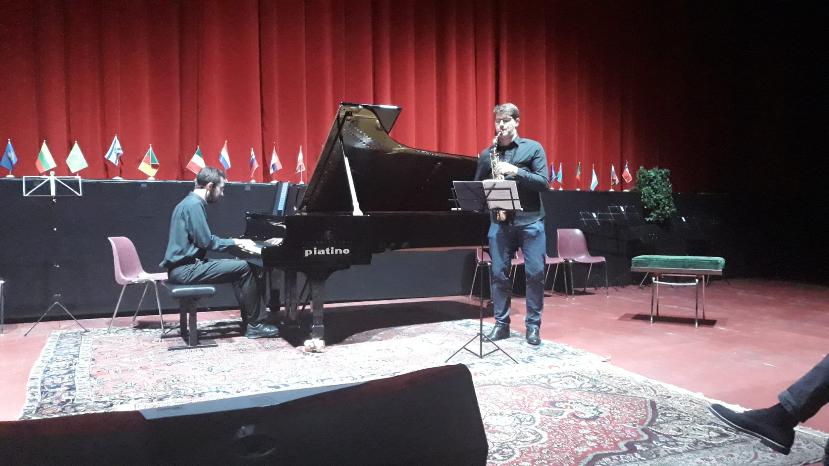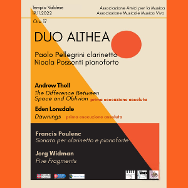Translate This Page
INTERNATIONAL COMPOSITION PRIZE
7th edition
First absolute premiere concert, Novembre 19th 2022
The Difference Between Space and Oblivion, by Andrew Tholl, written expressly for Duo Althea, winner of the “Novecento” Prize 2019, awarded to the best execution of a piece composed after 1950 in the Luigi Nono Chamber Music International Competition 2021.
Motivation of the Jury
“Every moment is another opportunity to shine” has a very clear dramatic arc, starting in a place of extreme simplicity and taking the listener on a journey through increasingly complex musical and emotional spaces. The work holds our attention all the way through. The composer masterfully builds up simple materials into dense structures, skilfully smudging the lines of the original materials into blurry soundscapes with conflicting pulses. Moments of lyrical clarity seamlessly emerge out of chaos and disappear again. Though many textures are derived through clear processes, there is a surprising musicality and sensitivity to the resulting material. The work has a cinematic, progressive rock feel, successfully mixing genres into a unified language, which is not contaminated with techniques that are extraneous to the composer’s intention.

The winner of the Novecento Prize, for the best performance of a piece of contemporary music at 24th International Chamber Music Competition Luiig Nono is Duo Althea (Paolo Pellegrini piano and Nicola Possenti, clarinet).
Eden Lonsdale is going to compose a new piece especially for them. The new composition will be premiered in a concert within the 2022 Concert season organized by Amici per la Musica Association.
Honorable Mentions:
ADRIEN TSILOGIANNIS (Belgium) www.adrientsilogiannis.com
LUIS QUINTANA (Puerto Rico) www.luis-quintana.com
JOSÉ COLLADO (Mexico) www.josuecollado.com
Mentions, Motivations of the Jury
ADRIEN TSILOGIANNIS
“Portait de Bat Enosh” has a very clear narrative and dramatic arc. The musical language evokes gentle tenderness and light, which is very suitable to the subject matter at hand. The composer works within a consistent sound world, while taking the material through different landscapes, like a river flowing through varied topographies, interacting with a changing riverbed and variation in the patterns of light and shadow. There is very good melodic use and thematic development throughout, and effective contrapuntal writing. The music takes us to some unexpected directions and demonstrates the composer’s wonderful ear and intuition. The slower passages are particularly beautiful, moving and impressive. The composer is able to sustain a longer structure. “S’élancer” has a similarly consistent style, but showcases a different character. The composer’s storytelling abilities are very impressive, but could be further enriched by exploring the greater variety of colour that each instrument is capable of producing.
LUIS QUINTANA
The jury found “Smudges over dripping ink” to have a very strong personality and confidence,. The composer constructed a compelling, unified and unusual sound world for this work. The textures, and harmonic and timbral exploration are strongly evocative of the title. The composer demonstrates an advanced use of rhythm. The particular combination of harmonic structures and instrumental techniques create illusions of electronics and instruments not present in the ensemble. The piano writing particularly shines through, with other instruments emerging out of its resonance. Some instrumental techniques, such as quarter tones and glissandi, could perhaps use a little more detail and individuality to fully convey the composer’s intention. “Textos Invisibles” wonderfully demonstrates the consistency of the composer’s voice and makes us want to hear more.
JOSÉ COLLADO
“Joie de vivre” is genuine, spontaneous and well constructed. The jury was particularly drawn to the blossoming, blissfully meditative opening gestures, which give the piece such a clear character. The feeling of the title comes across very well, though the first half of the piece exhibits more emotional and musical subtlety than the ending. It is refreshing to hear a piece of contemporary music successfully exploring more joyful emotional territory. The harmonic climate is very clear and often reassuring. There is a confidence in the use of instruments and clarity of ideas. The piece has a post-rock and post-minimalist feel with compelling use of the electric guitar.
The panel of judges 2020
Andrea Portera (Ita), supervisor scuolamusicafiesole.it/it/docenti/andrea-portera
Alissa Firsova (Eng/Rus) alissafirsova.com
Anna Pidgorna (Ukr/Can) annapidgorna.com
Competitors 2020
85,4% are from foreign countries, and 14,6% from Italy.
Most represented countries, besides Italy (6), are China (6), US (8), Japan, Sud Korea, Spain, Germany, Iran, Hungary (2).
Composer from 11 more countries are present.
For the first time we have competitors from Hungary, Egypt, Island, Belgium, Puerto Rico, Mexico.
The winner will be announced on 25th October 2020

